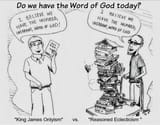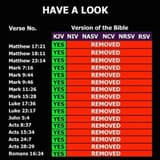>>17864394
>IIRC many of those verses aren't even significant
See what Jesus said in the Gospel:
"But he answered and said, It is written, Man shall not live by bread alone, but by every word that proceedeth out of the mouth of God."
(Matthew 4:4)
>and they're fully explained by cross-contamination between the gospels.
Not exactly. The missing verses are not true parallel passages. Almost all of them occur at different times in Jesus' ministry.
For example, Matthew 18:11 happens significantly earlier than Luke 19:20, which is a verse where Jesus says something similar, but is co-temporal with chapter 20 of Matthew, not chapter 18.
Similarly, Mark 7:16 has Jesus say, "If any man have ears to hear, let him hear." The parallel passage to this teaching is in Matthew 15, which does not have this saying. However, Jesus often said this at other times. This saying is meaningful in its own context in each place and should not just be removed. Similarly with Mark 11:26, which is parallel to Matthew 21.
In addition to these verses being said at different times from their supposed parallel passages, the sayings in question aren't always exactly the same either. In Matthew 17:21, Jesus said, "this kind goeth not out (οὐκ ἐκπορεύεται) but by prayer and fasting." This is slightly different than the statement Jesus also made in Mark 9:29, which says, "this kind can come forth by nothing (οὐδενὶ δύναται ἐξελθεῖν) but by prayer and fasting." The two sayings are not exactly the same, nor do the omitted words/verses occur at the same time.
In the case of Matthew 23:14, which is the only remaining possible "parallel passage" here, the words are not exactly the same there either. Only Matthew 23 includes the words, "Woe unto you, scribes and Pharisees, hypocrites!" at this place in Jesus' speech. He may have also said the same thing more than once during the course of His speech to the multitude. This would make Matthew 23:14 unique as well, meaning every verse mentioned is unique.












